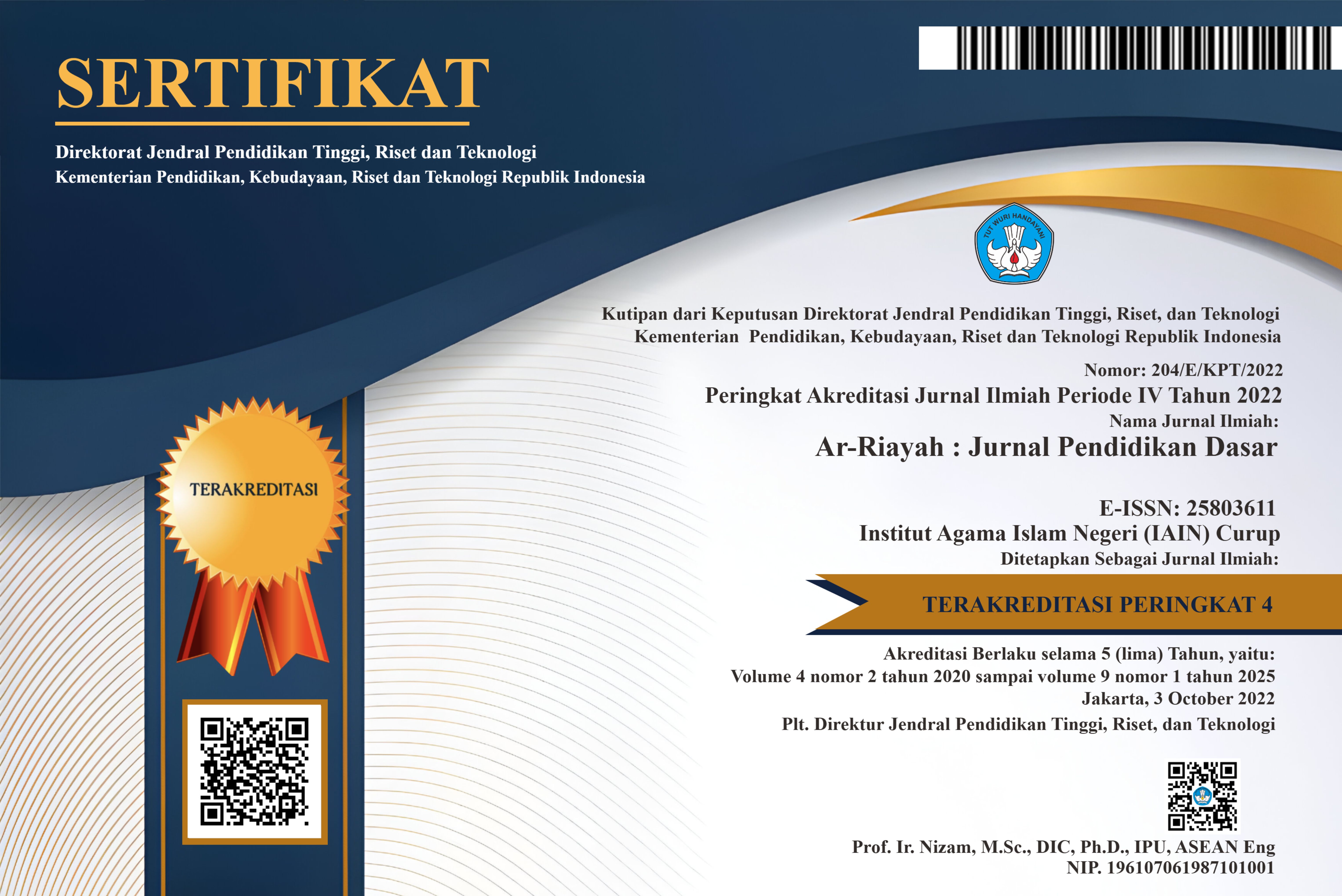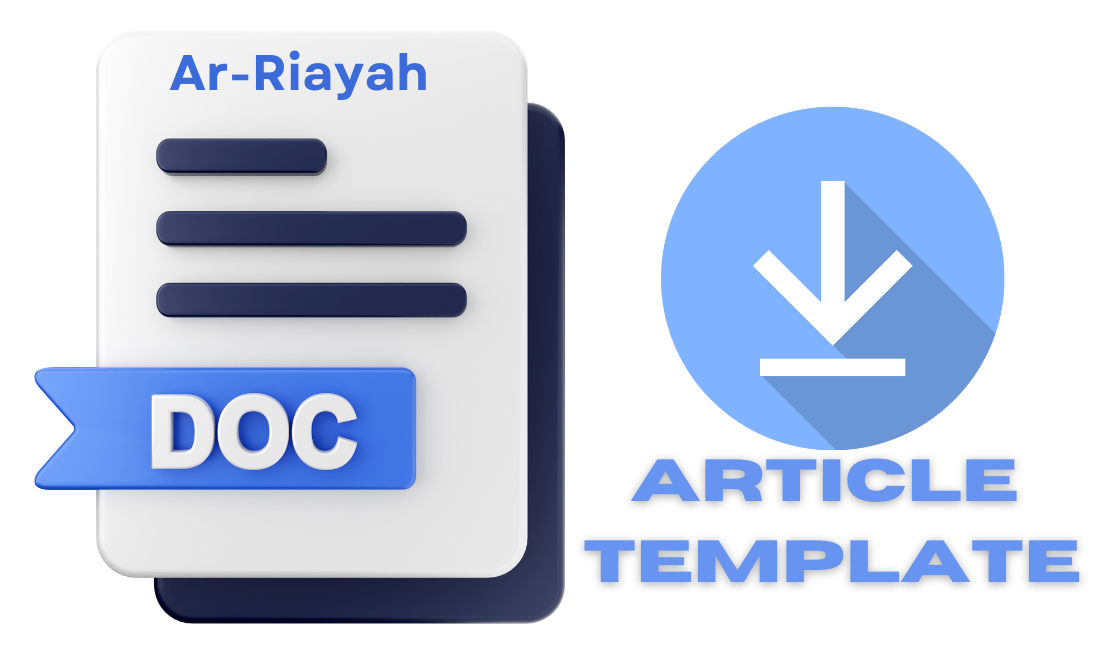Implementasi Pendidikan Kewirausahaan (Entrepreneurship) di Sekolah Dasar/Madrasah Ibtidaiyah
DOI:
https://doi.org/10.29240/jpd.v5i1.2671Keywords:
Entrepreneurship, madrasah ibtidaiyah, education, elementary schoolAbstract
This study aims to discuss and see the evaluation of entrepreneurship education in elementary schools / madrasah ibtidaiyah. Elementary schools and madrasah ibtidaiyah that have implemented entrepreneurship education that can be used as references include: SD Entrepreneur Muslim Alif-A Piyungan Yogyakarta, SD IT Alam Harum Purbalingga, and MI Terpadu Qurrota A'yun Ponorogo. This research uses a qualitative approach. This type of research data is qualitative data and the data source is secondary data. While the data method used is library research (library research). Data analysis techniques through data reduction, data display, and withdrawal from the literature study conducted. Meanwhile, to check the validity of the data using triangulation of data sources. The results of this study explain that, the implementation of Entrepreneurship Education in elementary schools / madrasah ibtidaiyah can be carried out in three stages, namely: (1) The planning stage, including: formulation of program objectives, program vision and mission of entrepreneurship education, material which then incorporates educational values. entrepreneurship that will be developed in the Learning Implementation Plan; (2) Implementation stage, including: class, entrepreneurship, integrated with subjects, self-development activities, school culture; and (3) The evaluation phase, including entrepreneurial education activities based on entrepreneurial values that have been internalized and implemented in the behavior seen in the activities of students at school.
Downloads
References
Afifah, D. N. (2019) Peran Pendidikan Entrepreneur dalam Membangun Kreativitas dan Kemandirian Siswa (Studi Kasus di Madrasah Ibtidaiyah Terpadu Qurrota A’yun Ponorogo), Skripsi
Badan Pusat Statistik. (2020). [REVISI per 18/02/2021] Tingkat Pengangguran Terbuka (TPT) sebesar 7,07 persen
Danim, S. (2011). Perkembangan Peserta Didik. Bandung. Alfabeta.
Darwis, M. (2016). Pendidikan Entrepreneurship dalam Pespektif Global. TARBIYATUNA
Desmita. (2009). Psikologi Perkembangan Peserta Didik. Bandung. Remaja Rosda Karya.
Ekawati, A. (2018). Market Day sebagai Upaya Pembiasaan untuk Menumbuhkah Jiwa Wirausaha Siswa Sejak Dini di SD IT Alam Harum Purbalingga. Skripsi. Universitas Muhammadiyah Purwokerto.
Fikriyati, M. (2013). Perkembangan Anak Usia Amas (Golden Age). Yogyakarta. Laras Media Prima.
Hidayah &Delitasari, I. (2017). Implementasi Pendidikan Entrepreneurship di SD Entrepreneur Muslim Alif-A Piyungan Yogyakarta. Proceeding The 6th University Research Colloquium 2017: Seri Pendidikan,Universitas Muhammadiyah Magelang.
Indiyani, S. & Hartono, B. (2020). Analisis Pengangguran dan Pertumbuhan Ekonomi sebagai Akibat Pandemi Covid-19, Perspektif: Jurnal Ekonomi & Manajemen Universitas Bina Sarana Informatika.
Izzaty, R. E. dkk. (2008). Perkembangan Peserta Didik. Yogyakarta. UNY Press.
Kholifah, N. & Nurtanto, M. (2016). Pengembangan Pendidikan Kewirausahaan Dalam Menanamkan Nilai-Nilai Entrepreneurship Untuk Menghadapi Masyarakat Ekonomi ASEAN (MEA). Prosiding Seminar Nasional Inovasi Pendidikan: Inovasi Pembelajaran Berbasis Karakter dalam Menghadapi Masyarakat Ekonomi ASEAN.
Meldina, T., Melinedri, M., Agustin, A., & Harahap, S. (2020). Integrasi Pembelajaran IPS pada Kurikulum 2013 di Sekolah Dasar. AR-RIAYAH : Jurnal Pendidikan Dasar,
Midayanti. N. (2018). Keadaan Ketenagakerjaan Indonesia Februari 2018. Jakarta. Badan Pusat Statistik.
Monks, F.J. dkk. (2006). Psikologi Perkembangan. Yogyakarta. Gadjah Mada University Press.
Muchson. (2017). Buku Ajar Entrepreneurship (Kewirausahaan). Jakarta. Guepedia.
Muhibbinsyah. (2011). Psikologi Pendekatan dengan Pendekatan Baru. Bandung. Remaja Rosdakarya.
Nurbudiyani, I. (2015). Manajemen Pengembangan Kewirausahaan (Entrepreneurship) Siswa SMKN-2 Palangkaraya. Pedagogik: Jurnal Pendidikan.
Peraturan Menteri Pendidikan dan Kebudayaan Republik Indonesia Nomor 20 Tahun 2016 Tentang Standar Kompetensi Lulusan Pendidikan Dasar dan Menengah
Soegoto, E. S. (2009). Entrepreneurship Menjadi Pebisnis Ulung. Jakarta. PT Gramedia.
Subroto, W. (2015). Menanamkan Nilai-Nilai Entrepreneurship Melalui Pendidikan Ekonomi Pada Era Masyarakat Ekonomi ASEAN. Jurnal Economia,
Tim Penulis Naskah Kewirausahaan. (2011). Pengembangan Pendidikan Kewirausahaan. Jakarta. Kementerian Pendidikan Nasional Badan Penelitian dan Pengembangan Pusat Kurikulum.
Wijatno, S.(2009). Pengantar Entrepreneurship. Jakarta. PT Gramedia Widiasarana Indonesia.
Wijatno, S. (2012). Entrepreneurship untuk Sekolah Dasar. Jakarta. Slemba Empat.
Wiyani, N. A. (2013). Konsep. Praktik. & Strategi Membumikan Pendidikan Karakter di SD/MI. Yogyakarta. Ar-Ruzz Media.
Zulaiha, S. (2017). Pendekatan Metodologis Dan Teologis Bagi Pengembangan dan Peningkatan Kualitas Guru MI. AR-RIAYAH : Jurnal Pendidikan Dasar
Zulfitria & Arif, Z. (2018). Membangun Kewirausahaan (Entrepreneurship) Qur’ani di Perguruan Tinggi. Rausyan Fikr Jurnal Pemikiran dan Pencerahan.
Downloads
Published
How to Cite
Issue
Section
Citation Check
License
Authors who publish with Ar-Riayah: Jurnal Pendidikan Dasar agree to the following terms:
Authors retain copyright and grant the journal right of first publication with the work simultaneously licensed under a Creative Commons Attribution-NonCommercial-ShareAlike 4.0 International License (CC BY-NC-SA 4.0) that allows others to share the work with an acknowledgment of the work's authorship and initial publication in this journal.
Authors are able to enter into separate, additional contractual arrangements for the non-exclusive distribution of the journal's published version of the work (e.g., post it to an institutional repository or publish it in a book), with an acknowledgment of its initial publication in this journal.
- Authors are permitted and encouraged to post their work online (e.g., in institutional repositories or on their website) prior to and during the submission process, as it can lead to productive exchanges, as well as earlier and greater citation of published work (See The Effect of Open Access).










